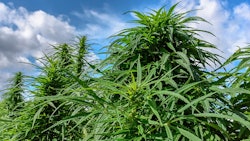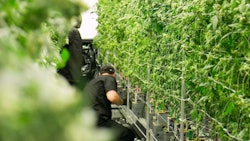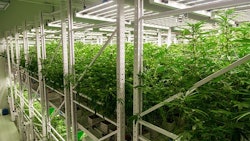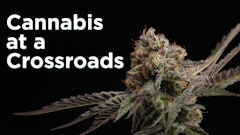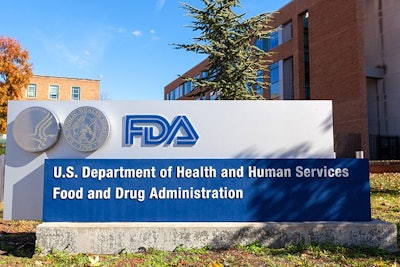
The U.S. Food and Drug Administration (FDA) has issued dozens of warning letters over the past several years to CBD companies, most recently calling out a group of businesses for claiming that their products can cure, treat or prevent COVID-19.
Now, the federal agency is setting its sights on the delta-8 THC space.
The FDA issued warning letters to five companies May 4 “for selling products labeled as containing delta-8 tetrahydrocannabinol (delta-8 THC) in ways that violate the Federal Food, Drug, and Cosmetic Act (FD&C Act),” according to a press release.
The warning letters, issued to ATLRx Inc., BioMD Plus LLC, Delta 8 Hemp, Kingdom Harvest LLC and M Six Labs Inc., also cite CBD-related violations of the FD&C Act, including marketing CBD products claiming to treat medical conditions in humans and animals, promoting them as dietary supplements, and adding CBD to human and animal foods.
“FDA’s announcement … that it had issued warning letters to five marketers of delta-8 THC is significant, although not all that unexpected,” Jonathan Havens, co-chair of the Cannabis Law Practice and the Food and Beverage Practice at Saul Ewing Arnstein & Lehr, told Cannabis Business Times. “However, the five warning letters represent the first enforcement actions taken by FDA against delta-8 marketers.”
The agency stated in its announcement that there are no FDA-approved drugs containing delta-8 THC, and that it considers any delta-8 product that claims to diagnose, cure, mitigate, treat or prevent diseases an unapproved new drug.
“The FDA has not evaluated whether these unapproved drug products are effective for the uses manufacturers claim, what an appropriate dose might be, how they could interact with FDA-approved drugs or other products, or whether they have dangerous side effects or other safety concerns,” the release stated.
In addition to addressing the illegal marketing of delta-8 THC products as unapproved treatments for medical conditions or other therapeutic uses, FDA officials said in the release that the warning letters also cite violations related to the misbranding of drugs—such as not including adequate directions for use—and the addition of delta-8 in food products.
“The FDA is very concerned about the growing popularity of delta-8 THC products being sold online and in stores nationwide,” FDA Principal Deputy Commissioner Janet Woodcock said in a public statement. “These products often include claims that they treat or alleviate the side effects related to a wide variety of diseases or medical disorders, such as cancer, multiple sclerosis, chronic pain, nausea and anxiety. It is extremely troubling that some of the food products are packaged and labeled in ways that may appeal to children. We will continue to safeguard Americans’ health and safety by monitoring the marketplace and taking action when companies illegally sell products that pose a risk to public health.”
The FDA published a consumer update about delta-8 THC in September 2021 to express concerns about the potential health effects of delta-8 products.
RELATED: Delta-8 THC Has ‘Serious Health Risks’ Warns Two Federal Agencies
“The FDA has received adverse event reports involving products containing delta-8 THC from consumers, health care practitioners, and law enforcement, some of which resulted in the need for hospitalization or emergency room treatment,” agency officials said in their release announcing the issuance of the warning letters. “The agency is also aware of an increasing number of exposure cases involving products containing delta-8 THC received by national poison control centers and alerts issued by state poison control centers describing safety concerns and adverse events with products containing delta-8 THC.”
In its warning letters, the FDA requested written responses from the five companies within 15 working days stating how the businesses will address the violations. Failure to respond could result in legal action, including product seizure and injunction, according to the release.
The claims cited in the letters—claims that the delta-8 products can treat medical conditions like cancer, multiple sclerosis, chronic pain, nausea, epilepsy and anxiety—largely mirror the claims that the FDA has targeted in warning letters to CBD product manufacturers, Havens said, although he highlighted one statement in the FDA’s recent announcement that caught his attention.
“Delta-8 THC is one of over 100 cannabinoids produced in the Cannabis sativa L. plant but is not found naturally in significant amounts,” the statement reads. “Concentrated amounts of delta-8 THC are typically manufactured from hemp-derived cannabidiol (CBD) and have psychoactive and intoxicating effects.”
Havens said this statement could provide insight into the FDA’s overall approach to the industry.
“There’s obviously been a lot of discussion regarding the federal legality of delta-8 and how it’s produced,” he said. “Although the [Drug Enforcement Administration] (DEA), not FDA, is responsible for enforcing the Controlled Substances Act and the Federal Analogue Act, FDA’s statement here about how a lot of the delta-8 that’s on the market now may be made (i.e., synthesized from CBD) could shed light on how regulators are approaching or will approach the federal treatment of delta-8.”
As Havens pointed out, the warning letters do not touch on the overall legality of delta-8 THC itself, and instead focus on the laws and regulations that the FDA enforces, such as the FD&C Act.
“The FDA’s jurisdiction is clear—it’s not the Controlled Substances Act, it’s the Federal Food, Drug, and Cosmetics Act,” Havens said. “It’s really going to be up to the Drug Enforcement Administration and also the U.S. Department of Agriculture to opine on, what exactly is the status of delta-8? And when I say status, I mean under the Controlled Substances Act. … Is it federally illegal marijuana, or is it federally legal hemp?”
Some could argue that because delta-8 is derived from federally legal hemp, it should be considered federally legal and not a controlled substance like cannabis.
“If you’re taking CBD from hemp and then you’re synthesizing it into something else—you’re taking hemp-derived CBD and you’re turning it into delta-8 THC, and then delta-8 has this euphoric-producing effect like delta-9 THC would have in the marijuana context, what then would DEA say about that?” Havens questioned. “Is it true that anything that comes from hemp that has a delta-9 THC concentration of 0.3% or less, is that always going to be federally legal? Is it not going to be considered marijuana?”
The Federal Analogue Act, which allows any chemical similar to a Schedule I or Schedule II substance to be treated as a Schedule I drug under federal law, could ultimately come into play to determine the federal legality of delta-8 THC, Havens said, but that would fall outside of the FDA’s jurisdiction.
“FDA’s enforcement actions here center on adding delta-8 to FDA-regulated products, not on the legality of delta-8,” Havens said. “I wouldn’t expect the FDA to talk about the control status of drugs. I would expect that to be left to the DEA.”
And, as with the CBD space, the FDA has yet to issue warning letters to delta-8 product manufacturers just for selling delta-8 THC.
“In other words, there has to be an aggravating factor (or multiple factors) to land in FDA’s crosshairs —at least so far,” Havens said. “These products were clearly on these regulators’ radar, and the claims that are included in these warning letters are of the nature that you would absolutely expect a federal regulator to go after. They’re pretty aggressive therapeutic claims, and they’re very similar to the ones that FDA has focused on in its CBD-related warning letters. If you tell someone that you’re treating anything related to cancer or chronic pain or epilepsy or those sorts of things, you’re going to get a warning letter from the FDA, plain and simple.”
Havens expects the agency to issue more batches of warning letters in the delta-8 space, just as it has in the CBD industry. And while he said the warning letters “are not a good look” for the industry, there are responsible operators out there who are trying to do the right thing in the absence of federal regulation.
“The warning letters aren’t meant to highlight the best and the brightest in the industry,” Havens said. “They’re meant to highlight the more egregious violations or alleged violations of the Federal Food, Drug, and Cosmetic Act. There are delta-8 products out there that are tested and produced in a compliant way and comply with the various state laws that permit these products.”
Ultimately, Havens is optimistic that the warning letters will weed out the bad actors in the delta-8 space, as they did to some degree in the CBD industry.
“While this is not a good look for the industry, I do think that it will make the industry better in that it will shine a light on whose marketing practices are unsavory and whose are responsible,” he said. “I think there could be an upside here."







